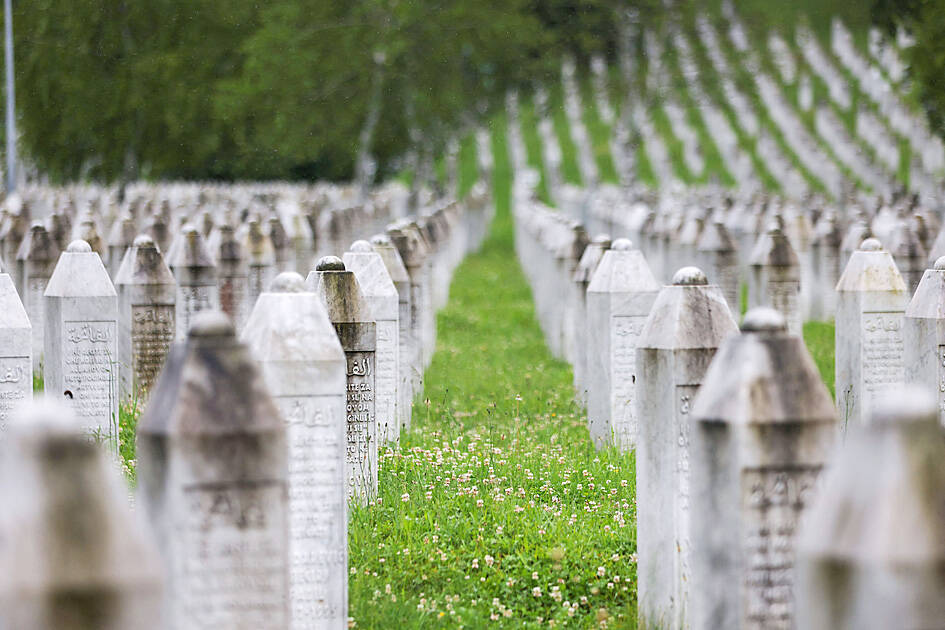The UN General Assembly declared July 11 an international day of remembrance of the Srebrenica genocide in a vote on Thursday that survivors branded as historic and Serbs as a failure, reflecting deep ethnic divisions in Bosnia.
The massacre of about 8,000 Bosnian Muslim men and boys in 1995, after the UN safe zone of Srebrenica was overrun by Bosnian Serb forces, took place during the Balkan wars that followed the disintegration of Yugoslavia and was seen as Europe’s worst atrocity since World War II.
The resolution, initiated by Germany and Rwanda and the cross-regional core group that included the US, was approved by a narrow margin of 84 votes in the 193-member General Assembly, with 19 votes against and 68 abstentions.

Photo: Reuters
“The truth and justice won today,” Bosnian President Denis Becirovic said.
The survivors of the massacre, mostly women who lost their male relatives, cried tears of joy at seeing the resolution as final closure after three decades.
The assembly said the resolution “decides to designate 11 July as the International Day of Reflection and Commemoration of the 1995 Genocide in Srebrenica, to be observed annually.”
It also condemns denial of the massacre and glorification of war criminals, calling for the remaining victims to be found and identified, and all perpetrators who are still at large to be brought to justice.
Serbia and Bosnian Serbs, who deny that the massacre constituted genocide, declared the vote a failure, saying that more countries did not vote in favor of the resolution than for it.
They had accused the authors of the resolution of branding Serbia a “genocidal nation.”
“Those people who wanted to stigmatize the Serbian nation failed and will never succeed,” Serbian President Aleksandar Vucic told reporters after the session. “They wanted to put a mark on our face and they failed.”
During the session, Vucic called on member states to vote against the resolution, saying it was “highly politicized” and would not contribute to the reconciliation in Bosnia and the region, but rather would open a Pandora’s box.
After the vote, Serbs drove through Belgrade, honking and waving Serbian flags.
The streets of towns across Serbia and Bosnia’s Serb Republic were decorated with Serbian flags and placards reading: “We are not genocidal people, we remember.”
“This is a failed resolution,” declared Bosnian Serb nationalist leader Milorad Dodik, who threatened that the Serb Republic, an autonomous region that makes up Bosnia along with the Bosniak-Croat federation under a peace deal, would secede if the resolution went ahead.
On July 11, 1995, Bosnian Serb forces commanded by General Ratko Mladic separated men and boys from women and executed them in the following days. Their remains were found years later in mass graves in eastern Bosnia, though some still do not know where their relatives died.
Two international courts have ruled the atrocity constituted genocide. Mladic and his political chief Radovan Karadzic were jailed for life for war crimes, including genocide, while about 50 Bosnian Serbs were also convicted.

CHANGE OF MIND: The Chinese crew at first showed a willingness to cooperate, but later regretted that when the ship arrived at the port and refused to enter Togolese Republic-registered Chinese freighter Hong Tai (宏泰號) and its crew have been detained on suspicion of deliberately damaging a submarine cable connecting Taiwan proper and Penghu County, the Coast Guard Administration said in a statement yesterday. The case would be subject to a “national security-level investigation” by the Tainan District Prosecutors’ Office, it added. The administration said that it had been monitoring the ship since 7:10pm on Saturday when it appeared to be loitering in waters about 6 nautical miles (11km) northwest of Tainan’s Chiang Chun Fishing Port, adding that the ship’s location was about 0.5 nautical miles north of the No.

A Chinese freighter that allegedly snapped an undersea cable linking Taiwan proper to Penghu County is suspected of being owned by a Chinese state-run company and had docked at the ports of Kaohsiung and Keelung for three months using different names. On Tuesday last week, the Togo-flagged freighter Hong Tai 58 (宏泰58號) and its Chinese crew were detained after the Taipei-Penghu No. 3 submarine cable was severed. When the Coast Guard Administration (CGA) first attempted to detain the ship on grounds of possible sabotage, its crew said the ship’s name was Hong Tai 168, although the Automatic Identification System (AIS)

An Akizuki-class destroyer last month made the first-ever solo transit of a Japan Maritime Self-Defense Force ship through the Taiwan Strait, Japanese government officials with knowledge of the matter said yesterday. The JS Akizuki carried out a north-to-south transit through the Taiwan Strait on Feb. 5 as it sailed to the South China Sea to participate in a joint exercise with US, Australian and Philippine forces that day. The Japanese destroyer JS Sazanami in September last year made the Japan Maritime Self-Defense Force’s first-ever transit through the Taiwan Strait, but it was joined by vessels from New Zealand and Australia,

COORDINATION, ASSURANCE: Separately, representatives reintroduced a bill that asks the state department to review guidelines on how the US engages with Taiwan US senators on Tuesday introduced the Taiwan travel and tourism coordination act, which they said would bolster bilateral travel and cooperation. The bill, proposed by US senators Marsha Blackburn and Brian Schatz, seeks to establish “robust security screenings for those traveling to the US from Asia, open new markets for American industry, and strengthen the economic partnership between the US and Taiwan,” they said in a statement. “Travel and tourism play a crucial role in a nation’s economic security,” but Taiwan faces “pressure and coercion from the Chinese Communist Party [CCP]” in this sector, the statement said. As Taiwan is a “vital trading